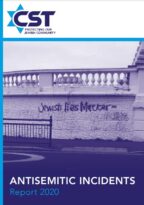Fonte:
https://cst.org.uk
CST ANTISEMITIC INCIDENTS REPORT 2020
CST’s Antisemitic Incidents Report 2020, published today, shows that last year CST recorded 1,668 antisemitic incidents across the UK. This is an 8% fall from the 1,813 incidents recorded in 2019 but is still the third-highest number of incidents CST has ever recorded in a calendar year. There were 1,690 antisemitic incidents recorded in 2018, 1,420 in June 2017 and 1,275 antisemitic incidents in 2016.
A further 402 reports of potential incidents were received by CST in 2020 but were not deemed to be antisemitic and are not included in this total of 1,668 antisemitic incidents. Many of these 402 potential incidents involved suspicious activity or possible hostile reconnaissance at Jewish locations; criminal activity affecting Jewish people and buildings; and anti-Israel activity that did not include antisemitic language, motivation or targeting.
The 1,668 antisemitic incidents CST recorded last year were clearly influenced by the pandemic. There were 41 incidents that referenced the pandemic alongside antisemitic language, and 19 cases of Jewish religious, educational or social events being ‘zoombombed’ by antisemites who accessed the events to express antisemitic abuse. There was a reduction in the number of incidents affecting Jewish schools, teachers and school students, but an increase in the number of incidents at people’s homes. The highest monthly totals came in January, February and June, when the pandemic either had not yet fully struck or when restrictions had been eased. In contrast, the lowest monthly incident totals came in March, April and December, when lockdown measures were at their strictest. Nevertheless, CST still recorded over 100 incidents in all but one month in 2020, which continues the pattern of historically high antisemitic incident figures in recent years: December 2020 was the first month for three years in which CST recorded fewer than 100 antisemitic incidents.
CST continued working throughout the pandemic. Our Incidents Team provided support for anyone who reported an antisemitic incident to us, while our researchers unearthed and exposed the hateful extremism of far right, far left and Islamist extremists. CST volunteers adapted to new, Covid-safe operational procedures and our 24/7 national security control centre remained operational throughout the year. We have no option but to carry on with this vital work, because we know that those who wish our community harm will do the same.
Forty-one incidents in 2020 involved references to the pandemic alongside antisemitic rhetoric. This ranged from conspiracy theories alleging Jewish involvement in creating and spreading Covid-19 (or creating the so-called ‘myth’ of Covid-19), to simply wishing that Jewish people catch the virus and die from it. Overall, 332 incidents, or almost one in five of all antisemitic incidents reported to CST in 2020, involved the expression of antisemitic conspiracy theories (compared to 370 incidents in 2019).
CST recorded 100 violent antisemitic incidents in 2020, a 39% fall from 158 incidents involving violence in 2019. Ninety-seven of these violent incidents were in the category of Assault while three were classified by CST as ‘Extreme Violence’, meaning they involved potential grievous bodily harm (GBH) or a threat to life, compared to just one in 2019. CST is not able to share details of these three incidents for legal reasons. There were 72 incidents of Damage & Desecration of Jewish property in 2020; 1,399 incidents of Abusive Behaviour, including verbal abuse, antisemitic graffiti, antisemitic abuse via social media and one-off hate mail; 85 direct antisemitic threats; and 12 cases of mass-mailed antisemitic leaflets or emails. All these totals are lower than the comparable figures in the same categories in 2019.
Online antisemitic incidents decreased by 9%, from 700 in 2019 to 634 in 2020. Nevertheless, this is still the second-highest annual total of online incidents ever reported to CST, reflecting the growing role that online platforms play as a medium for transmitting hate, especially at a time when social distancing has made face-to-face contact less common. These totals understate the scale of online antisemitism: CST only records antisemitic incidents if they have been reported by either the victim or a witness; if the content shows evidence of antisemitic language, motivation or targeting; and if the offender is based in the United Kingdom or has directly targeted a UK-based victim. Targeted campaigns directed at individual victims often involve dozens of accounts sending hundreds or even thousands of tweets, images or posts within a concentrated timespan, or hundreds of tweets from a single offender, but each campaign of this type will only be recorded by CST as a single incident.
One campaign of online antisemitism that attracted widespread attention in 2020 was the spate of antisemitic tweets posted by grime artist Wiley in July, which drew on tropes about Jewish power and money while comparing Jews to the Ku Klux Klan. This appeared to encourage others to express their own antisemitism: CST recorded 23 incidents in which the offender either attempted to justify Wiley’s antisemitic ideas or targeted those who spoke out against Wiley with further antisemitic abuse.
Two-thirds of the 1,668 antisemitic incidents in 2020 were recorded in Greater London and Greater Manchester, the two largest Jewish communities in the UK. CST recorded 941 antisemitic incidents in Greater London, a fall of 1% from the 955 incidents recorded in London in 2019; and a fall of 31% in antisemitic incidents in Greater Manchester, from 223 in 2019 to 153 in 2020. Elsewhere in the UK, CST recorded an antisemitic incident in all but one Police region across the country. CST recorded 58 antisemitic incidents in Gateshead, 50 in Leeds, 20 in Liverpool and 20 in Borehamwood & Elstree. Several Police regions saw increases in the number of incidents due to improved data sharing between CST and Police under a national information sharing agreement.


